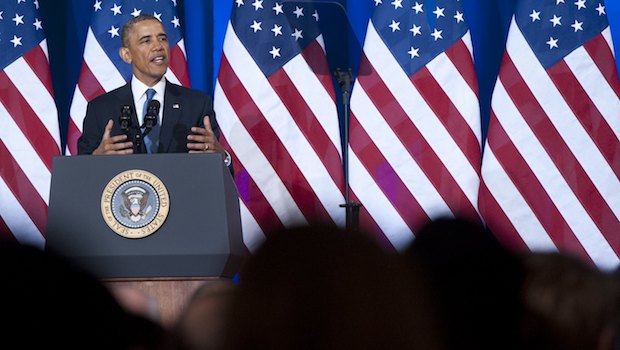
US President Barack Obama speaks about the National Security Agency and intelligence agencies surveillance techniques at the US Department of Justice in Washington, DC, on January 17, 2014. (AFP PHOTO/Saul Loeb)
Washington, AP—US President Barack Obama is ordering changes to the government’s vast collection of phone records, promising that “we will not monitor the communications of heads of state and government of our close friends and allies.”
The president said on Friday he would end the program “as it currently exists.” Obama’s speech had been highly anticipated after months of revelations about US spying by former National Security Agency (NSA) analyst Edward Snowden. He added that intelligence officials had not intentionally abused the program to invade privacy.
Obama said he believed critics of the program had been right to argue that without proper safeguards, the collection of phone records could be used to obtain more information about Americans’ private lives and open the door to more intrusive programs.
He also sought to reassure allies and others overseas. “The bottom line is that people around the world—regardless of their nationality—should know that the United States is not spying on ordinary people who don’t threaten our national security, and that we take their privacy concerns into account. This applies to foreign leaders as well,” he said.
He added: “The leaders of our close friends and allies deserve to know that if I want to learn what they think about an issue, I will pick up the phone and call them, rather than turning to surveillance.”
The leaks from Snowden, a fugitive now living in Russia, included revelations that the US was monitoring the phone of German Chancellor Angela Merkel, sparking intense anger in Europe.
However, Obama warned: “We cannot unilaterally disarm our intelligence agencies,” and added: “We know that the intelligence services of other countries—including some who feign surprise over the Snowden disclosures—are constantly probing our government and private sector networks.”
But he said the US must be held to a higher standard. “No one expects China to have an open debate about their surveillance programs, or Russia to take the privacy concerns of citizens into account,” he said. Obama also called for an end to the government’s control of phone data collected from millions of Americans.
The move marks a significant change to the NSA’s controversial bulk phone record collection program. Privacy advocates say moving the data outside the government’s control could minimize the risk of unauthorized or overly broad searches by the NSA.
However, it is expected to be met with criticism from those in the intelligence community who have been pressing Obama to keep the surveillance programs largely intact. Obama’s strategy would leave many of the specifics of intelligence-gathering changes to Congress, where lawmakers are at odds over the future of surveillance.
Privacy groups have been pressing for guidelines that significantly narrow the amount of data collected from Americans.
